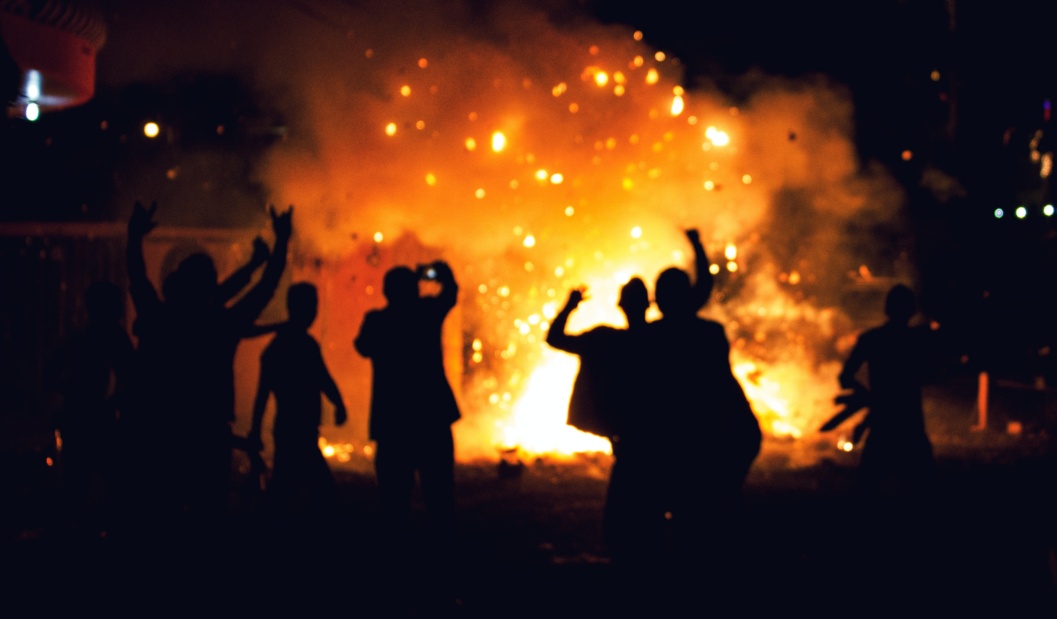This article is for general information only and should not be relied on for specific legal advice. The author will not be held responsible for any action that a person takes as a result of interpretation of the contents of this article. It is important to seek specific advice from a qualified and experienced lawyer for any legal problem.
What is a Riot?
It is an offence in Queensland to be involved in a riot. A riot can be described as a violent disturbance of the peace by a crowd of people. In Queensland, that ‘crowd’ includes 12 or more people gathering together causing civil disorder and lashing out in an often spontaneous attack of violence toward other people, authorities such as police or government and/or property.
The Law:
Section 61 of the Criminal Code (Qld) 1899 states:
(1) If—
(a) 12 or more persons who are present together (“assembled persons” ) use or threaten to use unlawful violence to a person or property for a common purpose; and
(b) the conduct of them taken together would cause a person in the vicinity to reasonably fear for the person’s personal safety;
each of the assembled persons commits the crime of taking part in a riot.
Elements of the Offence:
It is the duty of the prosecutor to prove beyond a reasonable doubt that the Defendant has committed the offence. Every charge has a number of elements that the Prosecutor must prove beyond a reasonable doubt. For the charge of Riot the Prosecution must prove:
- Defendant – The Prosecutor has to prove the identification of the offender;
- There were 12 Or More Persons Present Together;
- That those persons Used Or Threatened Violence
- For a Common Purpose;
That the conduct of those persons caused or could cause Fear to Others.
Maximum Penalty for Riot
The maximum penalty for this offence is three years imprisonment. This can extend to life imprisonment depending on aggravated circumstances.
Convictions
In Queensland, if a person is convicted of Riot, then the court could impose one of the following penalties:
- Jail (suspended, parole or actual time);
- Intensive Corrections Order;
- Probation;
- Community Service Order;
The actual penalty will depend on the circumstances of the matter including the seriousness of the offence and the individual circumstances and background of the Defendant.
Possible Defences For a Riot
There are a number of defences available to charges at law. Not every defence is available to every charge. You will need to seek specific legal advice to see if you have a defence available to you for this charge. Some of the common defences available in criminal charges are:
- Necessity;
- Mistake of Fact;
- Public Safety;
- Self Defence or defence of another person;
- Intoxication;
- Provocation;
- Accident;
- Duress;
- Compulsion;
- Insanity;
- Automatism
Which Court Will Your Matter be Heard in?
The charge of Riot (simpliciter) will be heard in the Magistrates Court in Queensland. The charge will be heard and determined by a Magistrate alone whether you plead guilty or not guilty. There is no jury in the Magistrates Court.
What Should I do if the Police Want to Speak to me About a Riot Allegation or if I’m Charged?
You have the right to remain silent. You DO have to provide police with your name, date of birth and contact details. You should NOT answer any questions, make any statement or participate in any interview with the police. You should be polite to the officer but insist that you want to talk to your lawyer. You have the right to telephone a friend, relative or lawyer.
Contact our criminal offence lawyers
If you are charged with a criminal offence, it is very important that you seek immediate legal advice. Our team at Brooke Winter Solicitors can give you over the phone advice. We have a solid reputation as expert Criminal Lawyers and can represent you in court. Call us on 1300 066 669 if you have any questions. We can assist you no matter where you are located and can appear in every court.





